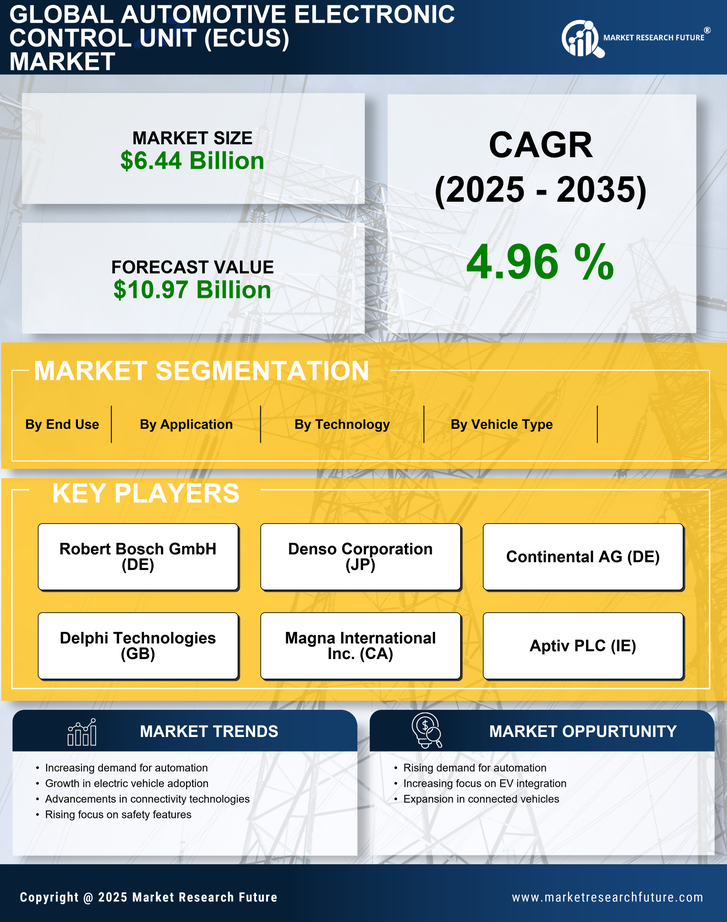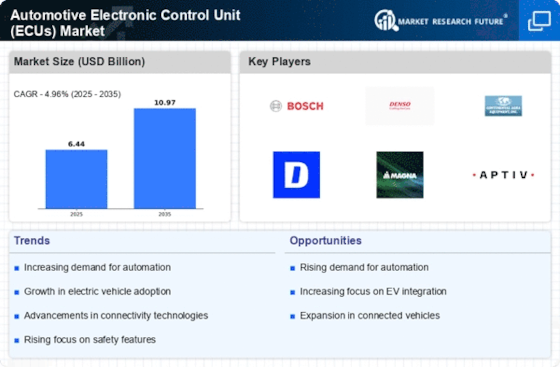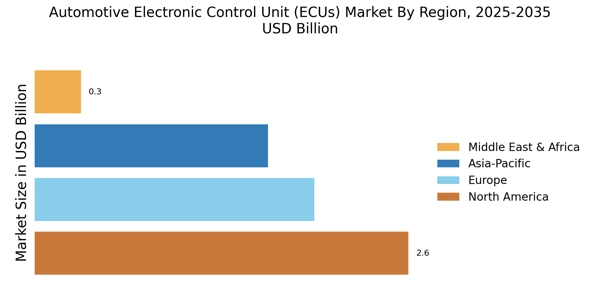Growth of Connected Vehicles
The Automotive Electronic Control Unit Market (ECUs) Market is being propelled by the growth of connected vehicles. As vehicles become more integrated with technology, the demand for ECUs that facilitate connectivity features, such as infotainment systems and vehicle-to-everything (V2X) communication, is on the rise. Data suggests that the connected car market is projected to reach a valuation of over 200 billion dollars by 2025. This growth is likely to drive the need for advanced ECUs capable of supporting various connectivity applications. Consequently, automakers are investing in the development of innovative ECU solutions to enhance the driving experience, thereby contributing to the expansion of the Automotive Electronic Control Unit Market (ECUs) Market.
Rising Demand for Fuel Efficiency
The Automotive Electronic Control Unit Market (ECUs) Market is experiencing a notable surge in demand for fuel-efficient vehicles. As consumers become increasingly environmentally conscious, automakers are compelled to enhance fuel efficiency in their offerings. This trend is reflected in the growing integration of ECUs, which optimize engine performance and reduce fuel consumption. According to recent data, vehicles equipped with advanced ECUs can achieve up to 20% better fuel efficiency compared to traditional models. Consequently, the automotive sector is investing heavily in ECU technology to meet regulatory standards and consumer expectations, thereby driving growth in the Automotive Electronic Control Unit Market (ECUs) Market.
Increasing Vehicle Electrification
The Automotive Electronic Control Unit Market (ECUs) Market is witnessing a paradigm shift towards vehicle electrification. As electric vehicles (EVs) gain traction, the need for specialized ECUs that manage battery systems, power distribution, and regenerative braking becomes paramount. Recent statistics suggest that the EV market is expected to account for nearly 30% of total vehicle sales by 2030. This transition necessitates the development of advanced ECUs tailored for electric powertrains, which in turn is likely to stimulate growth in the Automotive Electronic Control Unit Market (ECUs) Market. Manufacturers are investing in research and development to create innovative ECU solutions that cater to the unique requirements of electric vehicles.
Regulatory Compliance and Safety Standards
The Automotive Electronic Control Unit Market (ECUs) Market is heavily influenced by stringent regulatory compliance and safety standards. Governments worldwide are implementing regulations aimed at enhancing vehicle safety and reducing emissions. As a result, automakers are increasingly relying on ECUs to ensure compliance with these regulations. For instance, the introduction of advanced safety features, such as automatic emergency braking and electronic stability control, necessitates the integration of sophisticated ECUs. Market analysis indicates that the demand for safety-related ECUs is expected to grow significantly, driven by regulatory pressures. This trend underscores the critical role of ECUs in meeting safety and environmental standards within the Automotive Electronic Control Unit Market (ECUs) Market.
Advancements in Autonomous Driving Technologies
The Automotive Electronic Control Unit Market (ECUs) Market is significantly influenced by advancements in autonomous driving technologies. As the automotive landscape evolves, the demand for sophisticated ECUs that can process vast amounts of data in real-time is increasing. These units are essential for the functioning of various autonomous features, such as lane-keeping assistance and adaptive cruise control. Market data indicates that the autonomous vehicle segment is projected to grow at a compound annual growth rate of over 30% in the coming years. This growth is likely to propel the demand for advanced ECUs, thereby shaping the future of the Automotive Electronic Control Unit Market (ECUs) Market.


















